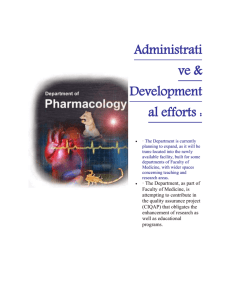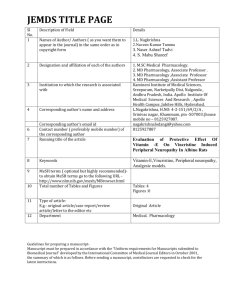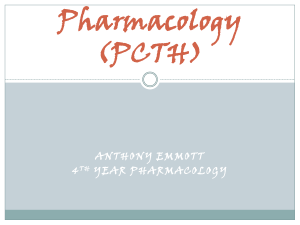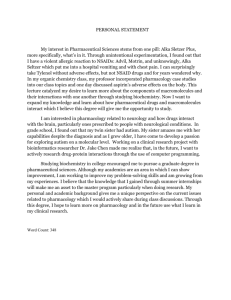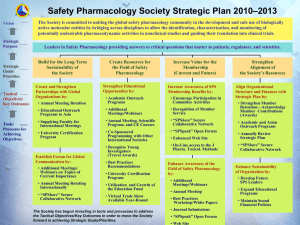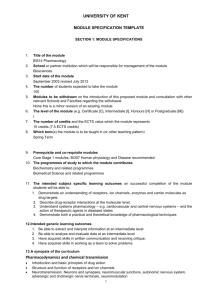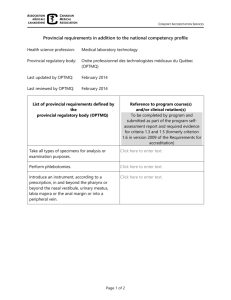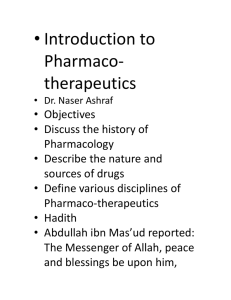Pharmacology and Toxicology
advertisement
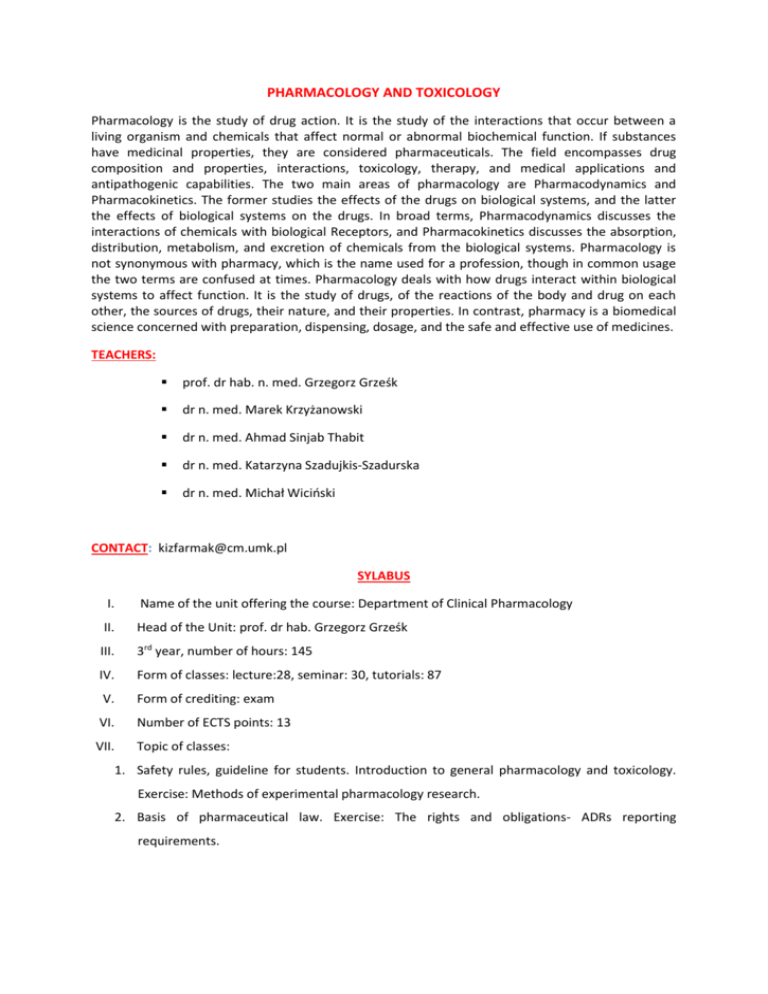
PHARMACOLOGY AND TOXICOLOGY Pharmacology is the study of drug action. It is the study of the interactions that occur between a living organism and chemicals that affect normal or abnormal biochemical function. If substances have medicinal properties, they are considered pharmaceuticals. The field encompasses drug composition and properties, interactions, toxicology, therapy, and medical applications and antipathogenic capabilities. The two main areas of pharmacology are Pharmacodynamics and Pharmacokinetics. The former studies the effects of the drugs on biological systems, and the latter the effects of biological systems on the drugs. In broad terms, Pharmacodynamics discusses the interactions of chemicals with biological Receptors, and Pharmacokinetics discusses the absorption, distribution, metabolism, and excretion of chemicals from the biological systems. Pharmacology is not synonymous with pharmacy, which is the name used for a profession, though in common usage the two terms are confused at times. Pharmacology deals with how drugs interact within biological systems to affect function. It is the study of drugs, of the reactions of the body and drug on each other, the sources of drugs, their nature, and their properties. In contrast, pharmacy is a biomedical science concerned with preparation, dispensing, dosage, and the safe and effective use of medicines. TEACHERS: prof. dr hab. n. med. Grzegorz Grześk dr n. med. Marek Krzyżanowski dr n. med. Ahmad Sinjab Thabit dr n. med. Katarzyna Szadujkis-Szadurska dr n. med. Michał Wiciński CONTACT: kizfarmak@cm.umk.pl SYLABUS I. Name of the unit offering the course: Department of Clinical Pharmacology II. Head of the Unit: prof. dr hab. Grzegorz Grześk III. 3rd year, number of hours: 145 IV. Form of classes: lecture:28, seminar: 30, tutorials: 87 V. Form of crediting: exam VI. Number of ECTS points: 13 VII. Topic of classes: 1. Safety rules, guideline for students. Introduction to general pharmacology and toxicology. Exercise: Methods of experimental pharmacology research. 2. Basis of pharmaceutical law. Exercise: The rights and obligations- ADRs reporting requirements. 3. Prescriptions writing and implementation rules. Exercise: Current changes prescription in legislation and implementation in accordance with National Health Fund. Prescriptions drug forms. 4. Fundamentals of medical toxicology. Exercise: Determination of basic parameters of the drugs toxicology. 5. Program's support - databases. Exercise: Searching for latest pharmacological drugs informations in the available databases - CM UMK and public databases. 6. Pharmacology with the elements of clinical pharmacology - drugs acting on Autonomic Nervous System. Exercise: Changes observations of isolated organs-responses after administration of the drug acting on Autonomic Nervous System. The use of pharmacological effects simulation programs. 7. Pharmacology with the elements of clinical pharmacology - drugs used in selected cardiovascular diseases. Exercise: Analysis and discussion of clinical cases of patients with cardiovascular diseases with particular reference to arterial hypertension, atherosclerosis and heart failure. The development of antitrombotic and antiplatelet therapy. 8. Pharmacology with the elements of clinical pharmacology - drugs used in selected diseases of the CNS. Exercise: Analysis and discussion of clinical cases of patients with Parkinson's disease, epilepsy, Alzheimer's, MS, depression, SCH, neurosis. The safety of chronic sedatives therapy. 9. Pharmacology with the elements of clinical pharmacology - drugs used in selected digestive system diseases. Exercise: Examples of therapies for patients with peptic ulcer disease, Zollinger-Ellison syndrome, reflux, diseases of the small intestine and colon, acute and chronic pancreatic diseases, therapy of bile secretion disorders. 10. Pharmacology with the elements of clinical pharmacology - drugs used in lipid disorders therapy. Exercise: Primary and secondary prevention of atherosclerosis, an analysis of selected clinical cases. Differences in therapies of hipolipemic drugs. 11. Pharmacology with the elements of clinical pharmacology - drugs used in therapy allergy. Exercise: Analysis of cases of patients with chronic allergies, chronic therapy methods modification. Terms and conditions of allergy testing and desensitization methods. 12. Pharmacology with the elements of clinical pharmacology - drugs used in therapy of asthma and COPD. Exercise: Analysis of clinical examples of patients in different stages of disease, spirometric values and methods of treatment. 13. Pharmacology with the elements of clinical pharmacology - drugs used in therapy of pain. Exercises: Examples of the analgesic therapies in selected disorders according to the WHO analgesic ladder. Adverse drug reactions montioring and their potency against pain. 14. Pharmacology with the elements of clinical pharmacology - drugs used in therapy of diabetes. Exercise: Insulin therapy patterns in selected clinical cases, diabetic coma. 15. Pharmacology with the elements of clinical pharmacology - drugs used in general and local anesthesia. Exercise: Describtion of basic anesthetic regimens. Analysis of selected clinical cases, with particular emphasis on toxicology and drug interactions. 16. Pharmacology with the elements of clinical pharmacology - drugs used in antifungal and antiviral therapies. Exercise: Describtion of therapy patterns in hepatitis, HIV, local and systemic fungal infections, patients with immune deficiencies. 17. Principles of rational antibiotic therapy. Antimicrobial agents. Exercise: Practical antibiotic therapy. 18. Pharmacology with the elements of clinical pharmacology - drugs used in the hematopoietic system disorders. Exercise: Analysis of treatment methods of patients with myeloproliferative diseases and anaemias. 19. Pharmacology with the elements of clinical pharmacology - drugs used in selected endocrine disorders. Exercise: Treatment methods of hormonal disorders with particular emphasis on thyroid , pituitary and adrenal glands diseases. 20. Pharmacology with the elements of clinical pharmacology - immunosupresive drugs. Exercise: Analysis of immunosuppressive regimens in selected disease entities with particular reference to the toxicological profile of the drug. 21. Vitamins. Exercise: alternative medicine, placebo effect. BOOKLIST: Rang, Dale, Ritter, and Moore, Pharmacology, 2012 Katzung, Basic and Clinical Pharmacology, 2007 RULES AND REGULATIONS

